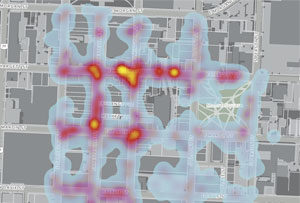Raleigh, North Carolina
An innovative mobile phone application is helping the city of Raleigh, N.C., use crowdsourced data to respond to business and resident complaints about downtown cleanliness. The solution required teamwork among no less than four city departments but has already proven valuable by reducing litter complaints, providing hard data for budget decisions, and consolidating cleanliness efforts within the city’s government.
The development of the Downtown Litter Reporter App “had all the elements of strong public policy work – use of data, creating efficiency with the application of new technology, collaborating with partners, explaining the limitations of the study, and offering short- and long-term actionable steps,” said City Manager, Ruffin L. Hall. “It shows that the city is continuing to look for creative, effective ways to serve the community.”
BACKGROUND
- In late summer 2015, city council requested that Raleigh staff examine ways to address cleanliness in response to citizen and business complaints.
- A Central Business District Clean Team was formed with representatives from different departments. The team met to define the problem and outline steps to remedy the issue.
- The team quickly decided it wanted to fully understand the scope of the litter issue and sought data to support its recommendations.
- Inspired by the worldwide #Litterati Instagram effort to crowdsource litter issues geographically, the Office of Sustainability staff suggested a mobile litter app.
- The IT department quickly embraced these suggestions and produced a custom working prototype Litter Reporter App in just a few days.
- The Litter Reporter App team determined the information that would be most valuable and created categories to effectively track types of waste.
- The IT department and Office of Sustainability worked with the Downtown Raleigh Alliance to create data-gathering routes and schedules to best capture (photograph and identify) potential issues.

A heat map of downtown Raleigh created from data gathered through the Litter Reporter.
- The implementation team, led by Parks, Recreation & Cultural Resources and Solid Waste Services, assembled two groups of employees that canvassed the specific routes and captured the needed data.
- The IT department used the data gathered to create heat maps that visually illustrate specific problem areas by type of litter.
- IT, the Office of Sustainability, and the Downtown Raleigh Alliance created a comprehensive report for review by the Central Business District Clean Team; which then
- developed recommendations for improvements and presented them to the city council for consideration as part of the budget process.
RESULTS
By creating an in-house solution, the team saved significant money. The team’s effort, in part, led to revising how public waste and litter are addressed in downtown Raleigh.
The implementation team continues to use the Litter Reporter App to monitor litter issues on a quarterly basis, and will continue assessing the situation as the cleanliness recommendations are implemented. Data gathered also will allow the city to readjust service schedules and receptacles as needed.
Quantifying the data removed the subjective nature of litter reporting and has led to thoughtful placement of new trash receptacles. The city has been able to minimize the number of cans purchased and ultimately the staff time to service those cans and pick up remaining litter.
Bigbelly Solar waste compacting stations were installed in the two primary litter hotspots identified by the Litter Reporter and at the problematic intersection of Hargett and Wilmington Streets.
It seems to be working, according to Assistant Park Superintendent Ivan Dickey. “You have bus stops where people are standing with something in their hand, and they finish their coffee and need somewhere to put it,” he said.
The city also is exploring expanded cigarette butt collection stations and different tools to pick up butts that land on the street and in tree grates.
The data also helped identify the need for a new comprehensive Downtown Clean Team, which has been included in the budget. Raleigh and Downtown Raleigh Alliance cleanliness efforts have been consolidated into this new 15-member team within the City’s Transportation Department and a coordinator has been hired to act as a single point of contact to streamline efficiency and provide better customer service overall.
Meet the Manager

